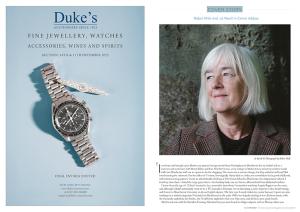
I was born and brought up in Dorset, my parents having moved from Nottingham to Dorchester for my father’s job as a surveyor and auctioneer with Henry Duke and Son. Our first house, a tiny cottage in Martinstown, meant my mother would walk into Dorchester with me in a pram to do the shopping. The move was a seismic change, but they settled in well and Dad loved running the saleroom. I’m the oldest of 5 sisters, but tragically Alexia died as a baby; we nevertheless had a good childhood, with tolerant, loving parents. I went to school locally, finishing at The Green School in Dorchester, the old grammar school. I loved my time there—hated the serge green skirts—but looking back, can see that we all benefitted from dedicated teachers.
I knew from the age of 12 that I wanted to be a journalist. Somehow, I remember watching Angela Rippon on the news, and although I didn’t particularly want to be a TV journalist, I became set on becoming a news reporter. I also loved writing, and I went to Manchester University to do an English degree. The first year I nearly failed my exams because I spent my time working on a student magazine I started, but Manchester in the early 1980s was hugely exciting; it was all about music, with the Hacienda nightclub, the Smiths, the 30 different nightclubs that cost 50p entry, and all those post-punk bands.
My first job was with the Swindon Evening Advertiser but you were based in village outposts such as Pewsey, where you got to report on the local cattle markets, fights at the parish council, traffic problems and court cases. On local newspapers, you see all of life, good and bad, but as a 22-year-old, I was desperate for a more exciting job. I couldn’t face working there any longer, so I broke my contract and went to work for a news agency in Bristol, essentially supplying copy for London papers. It was very fast moving, but I learned just enough to go to London and get shift work for the Fleet Street papers. Working shifts was how you showed the news desks that you could write, file copy on time, ask sensible questions, and work with photographers. You then had to phone your copy in, from a public phone (pre-mobile) to a highly skilled copy taker, who after a while would ask “Is there much more of this…?” That, of course, would teach you brevity. And you never knew where you’d be sent next.
I worked for the Sunday Times for a year; it was a tough training ground, going onto the Insight team and covering a famous inquest in Gibraltar into the killing of IRA members by the SAS. Then I moved to the Mail on Sunday as environment correspondent where I spent nearly a year reporting on the global scandal of the ivory trade. I worked closely with campaigners, spending a lot of time in Nairobi and Burundi. The decimation of African elephant herds was happening fast; the UN had backed the idea of a controlled, legal market, disastrous, because vested interests in such a lucrative trade made it open to every kind of corruption. Brian Jackman, of the Sunday Times, was covering the same story at great length. The campaigners gave copies of our reports to every delegate at the UN meeting in Lausanne in1989, where there was finally a vote for a complete ban on all ivory trading. It was at this conference where I met my husband Mike McCarthy, who was then The Times’ environment correspondent, and far more knowledgeable than me. We bonded over elephants.
But the travel, though wonderful, was too much for us, once we’d had our daughter, Flora. At that point, there was never the option of working part time or from home. In journalism those practices didn’t really exist until Covid. I moved to the London Evening Standard as their health editor, and then political correspondent, where I came to know and write about all the London hospitals, the major health reforms and medical breakthroughs. Later, working for editor Max Hastings, we were able to demonstrate to the Blair government the effects of the severe underfunding of the NHS. I wrote a lot about a series of scandals in maternity care, and it still worries me that there’s been really so little progress for women.
I went to the Observer newspaper for five years, wrote a book about a minor obsession of mine, bird flu, then in 2007 I started as special advisor to Alan Johnson, Labour Health Secretary, and then when he became Home Secretary. Being a Spad is a fantastically difficult, interesting and exciting role, immortalised of course in The Thick of It, but the best part of it was working with civil servants and politicians to try and find ways through seemingly intractable problems. I learned more from working with Alan than from anyone in my career, in terms of his negotiating skills, the way he came to a judgement and his extraordinary ability to communicate.
I then moved away from politics and into management, and worked for the Royal College of Surgeons, the Royal College of Paediatrics and Child Health as their chief executive, including the very difficult challenge of keeping the college, its global examinations and membership work running in spite of lockdown during the Covid years. Despite all the work the College did, children got left behind during Covid and I hope the public inquiry lays bare how their needs were completely brushed aside.
I left the College three years ago when we moved down to Dorset, but I was lucky to be able to continue working in child health. Alder Hey Children’s Hospital in Liverpool, the top specialist children’s hospital in the country, offered me a role as a Non-Executive Director, and I travel up to Liverpool regularly for meetings, and to see how the staff care for children and young people with so many conditions relating to their physical and mental health, including areas such as addiction—for example there is now a specialist vaping cessation clinic.
I’ve now been chief executive of Mosaic, supporting bereaved children, for two years. We help more than 400 children and young people each year across Dorset to deal with the loss of someone special to them, such as a parent or grandparent, through specialist counselling and coming to our activity days, sailing or day camp. The charity was the brainchild of Margaret Hannibal who began it 18 years ago and it’s nurtured by the communities—we are now rolling out bereavement cafes across the county, so children can come at the end of a school day to meet their peers, do some fun activities and talk to someone, if they want to. And that’s the crucial point, it’s their choice and it’s their life, so we are there to help them get back on track. I work with a brilliant small team of staff, trustees and volunteers who help with everything from fundraising to IT and every day is different, but hugely rewarding.
Mike and I have 3 children, Flora, Seb, and Hugo. Flora has just had our first grandchild, Sophia, a year ago, so I try to help her a lot with her care. It’s unmitigated joy, being with her. I just wish she’d keep her socks on for more than 30 seconds.
I admit I was a bit wary of returning to live in Dorset after a busy life in London. Mike and I knew that we wanted to live where we could walk out into glorious countryside, but what neither of us had bargained for was the unbelievable spirit of friendship and interest in history. It’s the people, obviously. It’s given us a new life and Cerne Abbas, I think, is a very special place. You can walk out in any direction over the hills and reflect on your day and be grateful for where life has taken you.



